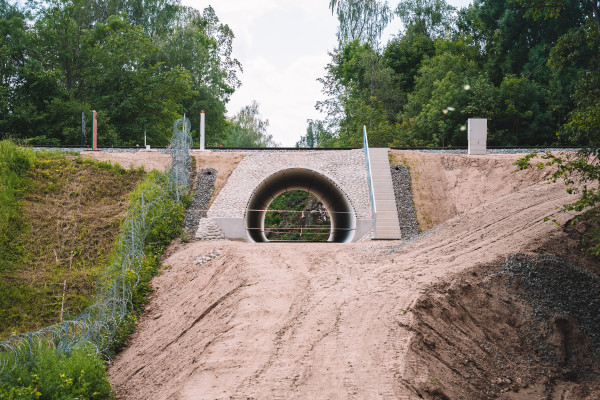








In August, the first major infrastructure facility on the Latvia-Belarus border was put into operation: the 30-metre-long tunnel, which significantly facilitates border security along the Daugavpils-Polotsk railway line, informs Renārs Griškevičs, Chairman of the Board of the SJSC (VAS) "State Real Estate".
"Every day we see more and more clearly how a modern border guarding infrastructure is being built on the eastern border of Latvia and the European Union, allowing border guards to perform their duties better and more efficiently. The government has endorsed the mobilisation plan and found a solution to raise the necessary funding, so we are committed to completing the building of fence in the dry areas of the Latvia-Belarus border by the end of this year and along rivers and lakes by the middle of next year. The solutions found allows us also to mobilise our forces to build a modern border guarding infrastructure in a 16.7 km stretch along the River Daugava", emphasises Mr Griškevičs.
The 30-tonne metal tunnel is one of the most functional and sustainable engineering structures of this kind in Latvia. At the same time, construction of a pontoon road for faster crossing of the White Lake is near to completion, more than 150 pontoons have already been assembled, all that remains is the landscaping of the surrounding area. The infrastructure for crossing the Black Lake is also under construction. These facilities could be put into operation already in the next few months, forecasts the Chairman of the Board at VNĪ.
Only about 13 km of fencing remains to be built in the first phase (85.45 km) of the Latvia-Belarus border infrastructure, i.e. 84%, or 72 km, has already been built within this phase by 28 August 2023. About half of the sections included in the second phase (63.9 km) are under construction and 2 km of fencing has been built so far. The second phase involves deforestation of the entire 30.47 km of the national border. Additional deforestation is needed to create a patrol track along nearly 30 km of public rivers. This will be possible as soon as the design of the infrastructure is finalised. The second phase of works is planned to involve the construction of the entire fence as soon as possible, completing the improvements of the border track by the end of 2024.
The third or Daugava phase provides for the construction of six communication towers with access roads, as well as a 16.7 km long patrol trail.
The budget (construction works, related works and services) for the communication towers with access roads is estimated at around €3.6 million (including VAT). These are planned to be covered with the support of the EU funds. Last week, the Cabinet of Ministers authorised VNĪ to assume financial commitments of EUR 5.8 million for the construction of a patrol trail within the Daugava phase.
Griškevičs also reminds that, until 12 September 2023, construction companies are invited to apply for the open price pool for the construction of a fence along the 57 km long priority section between the Krivanda Border Guarding Unit (RSN) and Aizgārša Border Guarding Unit (RSN) along the Latvia-Russia border.
Construction of the Latvia-Belarus border zone covering the total distance of 173 km has been provided for. Works within the first phase to a distance of 85.9 km will be completed by the end of 2023, within the second phase to a distance of 63.9 km and within the third phase to a distance of 16.7 km – by the end of 2024. The total cost of the first two phases of the border infrastructure construction is €102.7 million (including VAT) for construction and related services and works. In parallel with the construction of the fence, preparatory work has started on equipping the fence with state-of-the-art technologies; the responsibility for the construction and implementation of the border's technological infrastructure has been entrusted to SJSC (VAS) “Latvijas Valsts radio un televīzijas centrs”.
Implementation of the Eastern Border Construction Project is supervised by the Outer Border Infrastructure Construction Supervisory Committee, which consists of representatives from the Ministry of Defence, Ministry of Interior, Ministry of Foreign Affairs, Ministry of Economics, Ministry of Transport, Ministry of Agriculture, Ministry of Environmental Protection and Regional Development, State Border Guard, Provision State Agency, SJSC (VAS) “Latvijas Valsts radio un televīzijas centrs”, JSC (AS) “Latvijas Valsts meži”, Latvian Geospatial Information Agency and the National Armed Forces.
For up-to-date information on construction works on the Latvian-Belarusian border, please visit VNĪ website.
VNĪ successfully implements 44 projects of national importance, 24 of which are under construction. The total implementation budget of the projects exceeds EUR 336 million. VNĪ provides professional real estate management and maintenance for 371 building and structure properties, comprising 1007 buildings with a total area of 0.97 million m2, as well as land beneath structures with a total area of 607 ha, and 3404 land properties with a total area of 883 ha. VNĪ is one of 17 Latvian companies that received the highest platinum award in the Institute for Corporate Responsibility and Sustainability's Sustainability Index 2023, demonstrating good governance and sustainability of its operations. The company was founded in 1996 and the Ministry of Finance is its sole shareholder.

